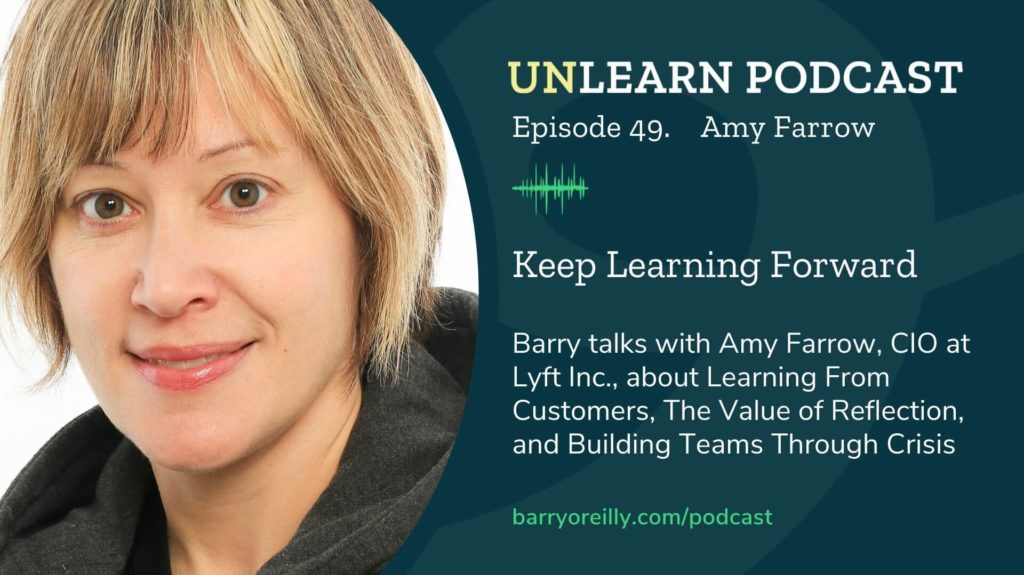“Amy Farrow [is] a seasoned executive who lives at the center of customer-focused product and technology innovation,” Barry O’Reilly says. Amy is a collaborator, team builder, and problem solver at heart, traits that she brought to her former roles at Salesforce and Twitter, and which she continues to champion as the current Chief Information Officer of Lyft. Amy and Barry talk about the value of reflection and how to leverage learning to build a better organization, including what not to do in times of challenge or crisis. As Barry points out, this episode “is a fantastic podcast to understand the convergence of customer insights, technology, and product to create great experiences.”
Learning From Customers
“There’s what you see and then there’s what you don’t see. And often what you don’t see is more impactful than what you do see,” Amy remarks. She and Barry discuss the importance of learning about and directly from customers. In her early career, Amy didn’t really understand why this was so important. Her time at Salesforce in particular gave her a new perspective. Barry comments that customer discovery is part of building great products and delivering great service. If a customer has a problem, help them to solve it as best as you can and bring back what you learned to the team so you can improve the product. Building this type of culture ultimately becomes a competitive advantage, as it did for Salesforce. [Listen from 3:00]

Keep Moving Forward
Leveraging your team’s expertise in a crisis is critical; to do that you first have to bring people together and build trust in one another. Barry comments that high-performance teams feel free to make mistakes and to discuss them openly without laying blame. In this healthy culture, teams respond quicker and learn faster than the competition, he says. In a challenge or crisis, keep going forward, Amy adds. Take small steps toward solving the problem. She says that she tries to understand why the problem arose without laying blame. Instead, her focus is on studying the problem and finding ways to solve it with the help of her team. [Listen from 10:50]
The Value of Reflection
Reflecting is hard work: Amy describes it as ‘cognitive load’ to constantly think about your actions. However, it’s critical work as it helps you to understand what is working and what you should do differently. “One bad pattern I see is this belief that you retrospect at the end… Why would you wait?” she remarks. You should reflect multiple times, including at the start of the year. Last year was tough for everyone, so she chose to reflect on her team’s accomplishments instead of the negatives. “We definitely learned from it, but I also just felt like people needed to let it go and move on from it more than any other year,” she tells Barry. Barry also shares an uplifting story about celebrating small wins. These small acts have a “profound impact on building team, on building trust, on role modeling … just upping the bar in terms of the culture you want to create in the company,” he comments. Amy emphasizes that it’s important for leaders to take action on what they learn from these reflective exercises. [Listen from 16:50]
Building Team Through Crisis
Building a team involves working together, communicating, and solving problems together, Amy argues. Get to know your teammates as humans; you just might learn that they bring more to the table than you thought. Amy says that adopting this approach is the reason she was able to keep her team engaged in such a challenging year. “You can be supportive and continue to challenge people at the same time,” she insists. Whereas 2020 was about surviving, she sees this year as offering opportunities, which her company is well-positioned to seize. One area of opportunity is to reinvent ways of working, especially being intentional about designing remote work. Barry adds that high-performing teams reflect on how they’re working together. He and Amy talk about how work has changed because of the pandemic. One positive outcome is that work has been humanized. “You see the whole person now,” Barry says. [Listen from 26:15]
Looking Ahead
Barry asks Amy what she is excited about for the future. She describes two ongoing unlearning events in her personal life. Overall, she believes that the end of this year will be much better than the start. Her advice to listeners is to “Keep learning forward”. Take what we learned about work and life and apply them to make work better in the future. [Listen from 35:00]
Don’t want to miss a post? Sign up for my podcast newsletter and monthly newsletter!















